Text

Data Cloud Platforms for Life Science Companies
Introducing Data Cloud Platforms for Life Science Companies from Multiplier AI. Our Data Cloud platform consists of 3 main modules - 1. Reference Data 2.Scientific Experts 3.Strategic Accounts Contact www.multiplierai.co to know more details about our data cloud platform.
#omnichannel marketing in pharma#ai in pharma#ai in pharma marketing#ai in pharmaceutical industry#artificial intelligence in pharma#artificial intelligence in pharmacy#generative ai in pharma#marketing strategy of pharmacy#pharma marketing podcast#pharma podcast
0 notes
Text

The Future Is Now: Launching Multiplier AI’s Agentic Suite & Data Cloud for Life Sciences
In life sciences, transformation isn’t a buzzword anymore — it’s a business mandate.
At Multiplier AI, we’ve always believed in building beyond the hype. Our vision is simple, yet powerful: Transforming Life Sciences with AI-Driven Products.
And today, we’re excited to share a major milestone in that journey — the launch of our Agentic Suite for Pharma and our enhanced Data Cloud platform.
Why Now?
In conversations with C-Suite leaders across global pharma, one thing has become crystal clear: Speed and precision will define leadership in the post-AI era.
Yet, many life sciences teams are held back by siloed data, rigid systems, and fragmented workflows. That’s exactly what we set out to solve.
So, we mapped the top 10 operational bottlenecks across the industry — from medical writing delays to stakeholder mapping — and built modular AI agents that accelerate outcomes across functions.
Introducing Our Agentic Suite (Now Out of Beta)
This is not just software. It’s a composable system of private, secure, role-specific AI agents — designed to work the way life sciences does. To know more information contact us at - www.multiplierai.co
Multiplier AI — Your Innovation Partner in the Age of Generative AI.
#omnichannel marketing in pharma#ai in pharma#ai in pharma marketing#ai in pharmaceutical industry#artificial intelligence in pharma#artificial intelligence in pharmacy#generative ai in pharma#marketing strategy of pharmacy#pharma marketing podcast#pharma podcast#AI - Driven Data Products#Reference Data#Strategic Accounts#Scientific Experts
0 notes
Text

Discover how AI is transforming healthcare. From faster diagnostics and personalized treatments to operational efficiency and intelligent pharma marketing—AI is revolutionizing the way we deliver care. Learn how platforms like Multiplier AI are helping healthcare and pharmaceutical companies grow smarter with Generative AI.
#omnichannel marketing in pharma#ai in pharma#ai in pharma marketing#ai in pharmaceutical industry#artificial intelligence in pharma#artificial intelligence in pharmacy#generative ai in pharma#marketing strategy of pharmacy#pharma marketing podcast#pharma podcast#aiinhealthcare#ai in medicine
0 notes
Text
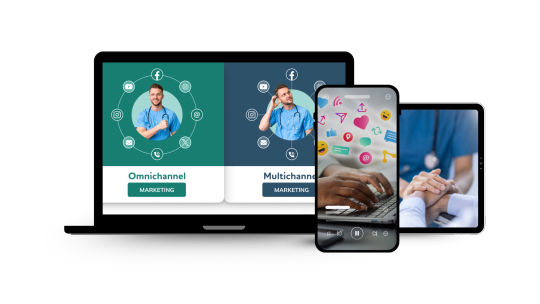
Discover how AI is transforming healthcare. From faster diagnostics and personalized treatments to operational efficiency and intelligent pharma marketing—AI is revolutionizing the way we deliver care. Learn how platforms like Multiplier AI are helping healthcare and pharmaceutical companies grow smarter with Generative AI.
#omnichannel marketing in pharma#ai in pharma#ai in pharma marketing#ai in pharmaceutical industry#artificial intelligence in pharma#artificial intelligence in pharmacy#generative ai in pharma#marketing strategy of pharmacy#pharma marketing podcast#pharma podcast#ai in healthcare#pharmaceutical marketing
1 note
·
View note
Text
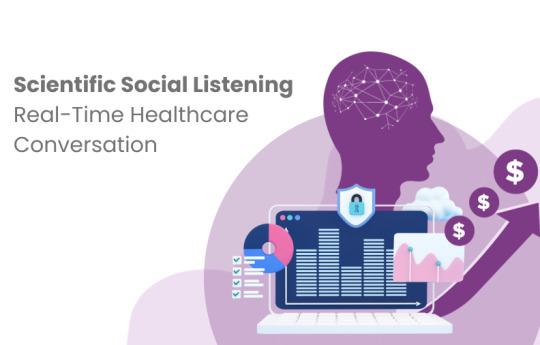
Reimagining Pharma Marketing with Multiplier AI Design inspired by the revolution happening in the world of pharmaceuticals marketing.
Since the post-pandemic shift, the marketing of pharmaceuticals has taken a 180-degree turn—and at the forefront of this transformation is Multiplier AI. This company blends cutting-edge AI with deep industry insight to power smarter, faster, and more ethical pharma marketing strategies.
This piece reflects the fusion of data, design, and human connection—just like what Multiplier AI brings to the healthcare world. From intelligent agents to predictive outreach, we’re not just marketing medicines—we’re reshaping the future of healthcare communication.
#omnichannel marketing in pharma#ai in pharma#ai in pharma marketing#ai in pharmaceutical industry#artificial intelligence in pharma#artificial intelligence in pharmacy#marketing strategy of pharmacy#generative ai in pharma#pharma marketing podcast#pharma podcast#ai in healthcare#marketing of pharmaceuticals#pharmaceuticals marketing#ai in pharmaceuticals
1 note
·
View note
Text
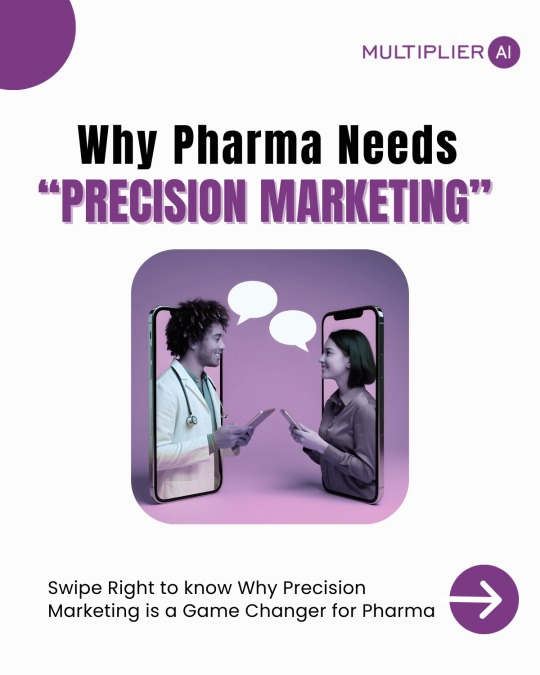





AI in Healthcare, Redefined by Multiplier AI At the intersection of data science and patient outcomes, Multiplier AI is transforming how the healthcare and pharmaceutical industries communicate, engage, and grow.
Through cutting-edge AI in healthcare solutions, we empower pharma brands to deliver personalized, compliant, and data-driven campaigns that resonate with both HCPs and patients. From advanced audience segmentation to real-time insights, our platform ensures your message reaches the right people—at the right time.
Join us in shaping the future of healthcare marketing—smarter strategies start with smarter AI. www.multiplierai.co
#omnichannel marketing in pharma#ai in pharma#ai in pharma marketing#ai in pharmaceutical industry#artificial intelligence in pharma#artificial intelligence in pharmacy#generative ai in pharma#marketing strategy of pharmacy#pharma marketing podcast#pharma podcast#ai in healthcare#ai in pharmaceuticals
1 note
·
View note
Text

Discover how AI is transforming healthcare. From faster diagnostics and personalized treatments to operational efficiency and intelligent pharma marketing—AI is revolutionizing the way we deliver care. Learn how platforms like Multiplier AI are helping healthcare and pharmaceutical companies grow smarter with Generative AI.
#omnichannel marketing in pharma#ai in pharma#ai in pharma marketing#ai in pharmaceutical industry#artificial intelligence in pharma#artificial intelligence in pharmacy#generative ai in pharma#marketing strategy of pharmacy#pharma marketing podcast#pharma podcast#ai in healthcare
1 note
·
View note
Text

AI in healthcare today is a strong ecosystem. Marketing teams apply AI-driven insights to predict patient questions even before they are asked. Predictive analytics enable forecasting health trends, while personalization engines personalize communication based on individual preferences, behaviors, and health status.
Imagine a patient being sent personalized information about preventive screenings at the very time they’re most likely to book an appointment. That’s the new normal.
Contact us for more details - www.multiplierai.co
#omnichannel marketing in pharma#ai in pharma marketing#ai in pharma#ai in pharmaceutical industry#artificial intelligence in pharma#artificial intelligence in pharmacy#generative ai in pharma#marketing strategy of pharmacy#pharma marketing podcast#pharma podcast#ai in healthcare#artificial intelligence in healthcare
1 note
·
View note
Text

Hosted by Saumya Prakash, co-founder of Multiplier AI, the Pharma Marketing Podcast delves deep into the intersection of data, generative AI, and pharmaceutical marketing. Each episode brings forth insights from industry leaders, offering listeners a comprehensive playbook to navigate the complexities of modern pharma marketing.
Follow our youtube channel for more updates - @multiplierai
#omnichannel marketing in pharma#ai in pharma#ai in pharma marketing#ai in pharmaceutical industry#artificial intelligence in pharma#artificial intelligence in pharmacy#generative ai in pharma#marketing strategy of pharmacy#pharma marketing podcast#pharma podcast#ai in healthcare
1 note
·
View note
Text

Imagine this future: Healthcare Marketing is not only data-driven but highly personal, predictive, and intuitive. Such a future already exists, with the advent of AI in healthcare. In this blog, you will embark on the intriguing experience of how AI is revolutionizing healthcare marketing—reshaping patient experiences, gaining trust, and rewriting success stories. Click Here to Know Detailed Information - Multiplier AI
#omnichannel marketing in pharma#ai in pharma#ai in pharma marketing#ai in pharmaceutical industry#artificial intelligence in pharma#artificial intelligence in pharmacy#generative ai in pharma#marketing strategy of pharmacy#pharma marketing podcast#pharma podcast#ai in healthcare
1 note
·
View note
Text


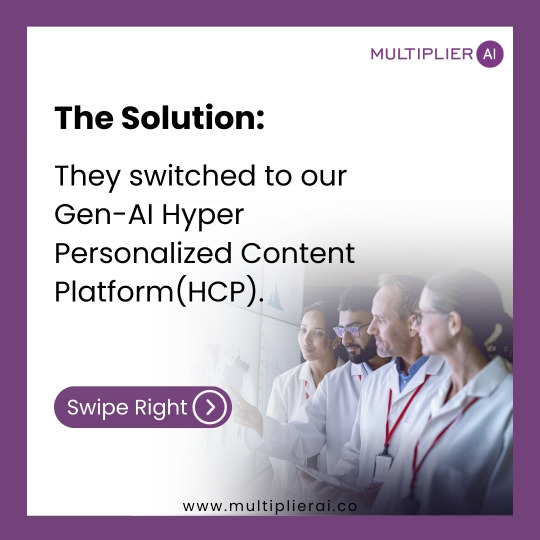


A global pharma brand struggled to engage doctors—until they switched to Gen-AI powered hyper-personalization with Multiplier AI. Result? Every HCP now receives content that actually matters to them. Swipe through the transformation Curious how they did it? Read the full case study - 👉 https://multiplierai.co/casestudy-2/
#omnichannel marketing in pharma#ai in pharma#ai in pharma marketing#ai in pharmaceutical industry#artificial intelligence in pharma#artificial intelligence in pharmacy#generative ai in pharma#marketing strategy of pharmacy#pharma marketing podcast#pharma podcast#ai in healthcare#ai in marketing
1 note
·
View note
Text

Multiplier AI is one of the leading pharma marketing company which offers advanced AI in pharmaceutical industry like Gen AI Doctor Data Platform, GPT & LLM Based Tools & more to increase the growth of pharma & healthcare companies. Contact us to know more details - (+91)- 9100379991
#omnichannel marketing in pharma#ai in pharma#ai in pharma marketing#ai in pharmaceutical industry#artificial intelligence in pharma#artificial intelligence in pharmacy#generative ai in pharma#marketing strategy of pharmacy#pharma marketing podcast#pharma podcast
1 note
·
View note
Text

Generative AI, often referred to as GenAI, represents a revolutionary leap in the realm of artificial intelligence. It functions akin to an exceptionally intelligent assistant, possessing the capability to craft new, original content. Imagine a highly advanced computer program equipped with the ability to write intricate articles, design complex images, or even compose harmonious music pieces.
Contact us for more details - www.multiplierai.co
#omnichannel marketing in pharma#ai in pharma#ai in pharma marketing#ai in pharmaceutical industry#artificial intelligence in pharma#artificial intelligence in pharmacy#generative ai in pharma#marketing strategy of pharmacy#pharma marketing podcast#pharma podcast#ai in healthcare#ai in marketing#ai in medicine
1 note
·
View note
Text
Navigating Compliance in Pharma Marketing: Omni-Channel Marketing.
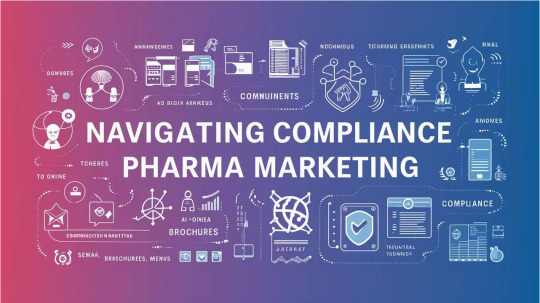
Pharmaceuticals is a highly competitive industry, and multiple companies have realized that harnessing the power of AI and digital media is the checkmate move to stay on top of the competition. One way this has manifested is through omni channel pharma marketing.
A guide to Omnichannel marketing
Omni-channel pharma marketing integrates various forms of communication channels, both online and offline, to provide a unified and personalized experience to customers aka the target audience. This method includes traditional media like brochures, one-on-one meetings, digital platforms like social media, and more. This approach touches upon all relevant platforms of information transmission, thus guaranteeing enhanced sales and customer engagement.
Omni-Channel Marketing Strategies: Challenges and Solutions
The pharmaceutical Industry has strict regulation and rules, because of the drastic effects it can have with one small wrong, aimed at ensuring ethics in the promotion of products and HCP and patient welfare. These regulations govern the collection of data and the use of said data, privacy, transparency, etc. The rules and regulations vary from country to country.
To successfully implement omnichannel marketing strategies, pharma companies have to prioritize compliance at every stage of marketing campaigns. This involves reviewing every step of the drug launch process including marketing, adherence to industry guidelines, and monitoring promotional works constantly.
Omni-channel pharma marketing strategy allows brands to keep updating and providing customers with real-time updates and information. They can use different channels to send different types of information, like educational content, product information, etc in a manner that is engaging and accessible.
Omnichannel strategy is like a marathon, it has touchpoints, which make it easier to access and monitor the data that were sent and received. This visibility is not just in compliance with regulations but also helps brands optimize their marketing efforts based on real-time data and updates.
By leveraging data and analytics, omnichannel marketing can make sure that data is personalized differently for different channels based on the need, this can help provide information to HCPs and Patients based on regulations. This helps improve engagement and maintain trustful relationships with HCPs and Patients.
For instance, compliance doesn’t allow the direct promotion of drugs to the patients, omnichannel marketing strategies can help reach the patients about your products without it being promotional, through information pamphlets they got from being prescribed the medicine. Disease prevention campaigns can mention drugs if a qualified person thinks it helps with the disease. The patient gets information, searches the site, signs up for the newsletter and then gets personalized mail with informative details on the product.
Now where can we place Multiplier AI here? Everywhere. It offers products made to enhance omnichannel marketing for brands. It provides solutions, especially for brands; it helps segment HCP and Patient data and provides insight for content generation based on data, and these insights can be integrated with omnichannel marketing while assigning what sort of content is required and how it is to be disseminated.
In conclusion, compliance in pharma marketing trumps any other agenda, as if one deviance can cause your company to get shut down, and make even a lot suffer from the same. By embracing omnichannel marketing and AI-powered solutions, brands can wade through stringent rules and regulations while achieving marketing success.
#omnichannel marketing in pharma#ai in pharma#ai in pharma marketing#ai in pharmaceutical industry#artificial intelligence in pharma#artificial intelligence in pharmacy#generative ai in pharma#marketing strategy of pharmacy#pharma marketing podcast#pharma podcast#ai in healthcare#ai in medical#ai and healthcare
0 notes
Text
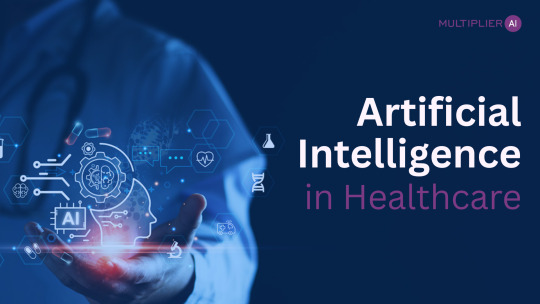
Multiplier AI is a leading AI-driven pharma marketing company that leverages cutting-edge technology to enhance the relationship between healthcare providers, doctors, and patients. Specializing in omni-channel pharma marketing strategies, Multiplier AI utilizes advanced AI tools like Gen AI, GPT & LLM-based tools, and Patient Intelligence Platforms to optimize marketing efforts, streamline doctor referrals, and drive patient engagement. By using data-driven insights, Multiplier AI helps pharmaceutical companies and healthcare institutions deliver personalized, impactful, and timely communication for better healthcare outcomes.
#omnichannel marketing in pharma#ai in pharma marketing#ai in pharma#ai in pharmaceutical industry#artificial intelligence in pharma#artificial intelligence in pharmacy#generative ai in pharma#pharma marketing podcast#pharma podcast#marketing strategy of pharmacy#ai in healthcare#healthcare
0 notes
Text
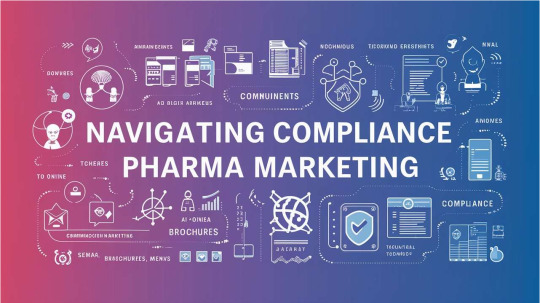
Omni-channel pharma marketing integrates various forms of communication channels, both online and offline, to provide a unified and personalized experience to customers aka the target audience. This method includes traditional media like brochures, one-on-one meetings, digital platforms like social media, and more. This approach touches upon all relevant platforms of information transmission, thus guaranteeing enhanced sales and customer engagement. Contact us for more details - www.multiplierai.co
#omnichannel marketing in pharma#ai in pharma#ai in pharma marketing#ai in pharmaceutical industry#artificial intelligence in pharma#artificial intelligence in pharmacy#generative ai in pharma#marketing strategy of pharmacy#pharma marketing podcast#pharma podcast
1 note
·
View note
Text

The healthcare and pharma industries are undergoing a seismic shift, driven by technological advancements and changing consumer expectations. As we approach 2025, marketers in this space must adapt to stay competitive. Here are five real, impactful trends that will define the future of healthcare and pharma marketing — and how innovative companies like Multiplier AI are leading the way. https://multiplierai.co/
#omnichannel marketing in pharma#ai in pharma#ai in pharma marketing#ai in pharmaceutical industry#artificial intelligence in pharma#artificial intelligence in pharmacy#generative ai in pharma#marketing strategy of pharmacy#pharma marketing podcast#pharma podcast
0 notes